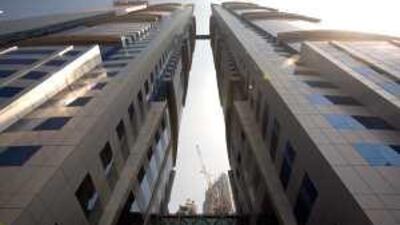DUBAI // Damas, the region's largest jewellery company, is close to signing a debt standstill on up to Dh4 billion (US$1.08bn) it owes, and asset liquidation has begun, informed sources say. An informal standstill on principal payments on its loans involving more than 20 banks has been in place since November.
Damas is working towards an official agreement, under which it will defer its principal loan payments until May 31 but still accrue interest, the source said. "The banks and the management are working together to restructure the debt because they believe the core business of the company continues to be sound." Terms of a formal standstill may be reached in the next fortnight. The Dubai-based firm may also name a partner at PricewaterhouseCoopers as its chief restructuring adviser, the source added.
The Abdullah brothers, the company's majority shareholders, have begun the process of liquidating assets outside of Damas to pay the company back the $165 million used in "unauthorised transactions", another informed source said. Most of the investments made with Damas funds were in properties in Dubai, which are difficult to sell in the depressed market. Property prices have dropped as much as 50 per cent from their peaks.
This has led the Abdullah brothers to consider selling personal assets to help raise funds. Yacht brokers in Dubai have said the brothers have recently been promoting the sale of their yacht, which has been on the market since before Tawhid Abdullah resigned as the company's chief executive after disclosing the transactions. Damas said the process of restructuring had begun. "The restructuring is well on its way and the family remains committed to repaying the company in full," its statement read.
Damas said in its financial statements released last month that it needed to secure a debt standstill to remain in business. While the company's underlying retail business was profitable, with a gross income of Dh320m for the six months ending in September, large write-downs of underperforming loans and investments resulted in heavy losses. One such liability was Dh300m lent to Dubai Ventures, a unit of Dubai Holding. The money was to be repaid by August 2008, but on August 18 last year, Damas signed an agreement to convert it into an investment in the fund.
Damas later found the value of the investment was just Dh73.5m and comprised only Damas shares. Its board did not authorise this conversion and is seeking to recoup the full amount. The company's share price has also fallen steeply since Tawhid Abdullah resigned on October 12. The transactions in question involved at least 50 deals, mainly in property, including the Angsana Hotel and Suites in Dubai, a shopping mall in Turkey and Bupa Cromwell hospital in London, according to a source familiar with the matter. PricewaterhouseCoopers is conducting a forensic audit to investigate the transactions.
Tawhid and his brothers, Tawfique and Tamjid, who are descendants of Damas's founder, signed an agreement on November 4 to pay back the amount of the transactions within 18 months. The Abdullah brothers have also pledged to return 350 million of their 515 million shares if they fail to pay Dh200m within six months, Dh400m within 12 months and the full amount within 18 months. If they were to default on these payments back to Damas, it would reduce their share in the company from more than 51 per cent to 16 per cent.
aligaya@thenational.ae bhope@thenational.ae

